Global Horizons Showcases International Trade Insights in Collaboration with Leading Industry Bodies
The Association of Translation Companies is collaborating with the Chartered Institute of Export & International…
New research by the ATC’s academic partners at the University of Portsmouth reveals that languages continue to be very much in demand in the UK’s job market, across every industry sector.
Current language roles needed in the job market
By Dr Begoña Rodríguez de Céspedes (begona.rodriguez@port.ac.uk)
Senior Lecturer in Translation Studies, University of Portsmouth
University Council of Modern Languages (UCML) Translation and Interpreting
This report reveals the analysis and insights behind data collected from job vacancies advertised on various online platforms over the summer of 2022 when many graduates were applying for jobs in the UK. The data unequivocally shows that languages are very much in demand across every industry sector. It is the right time for stakeholders and policy makers to come together to reverse the widening of the current talent gap in the market.
Context
According to the 2021 Association of Translation Companies (ATC) report, the market for language services in the UK continues to grow. In 2019, it was estimated that the current size of this market in the UK is between GBP 1.5 and 1.7 billion, up from GBP 1.35 billion two years previously. The UK is the largest single-country market for language services in Europe.
A study presented in the LO-C 30 Report (May 2021) revealed that language capabilities are a key driver for UK SME export success. SMEs that make use of language capabilities are 30% more successful in exporting than those who do not.
Against this backdrop and in parallel, language learning in the UK is declining, with some university language departments closing and companies struggling to recruit language specialists to cater for their needs. The reasons for the decline have been well documented including the negative impact of Brexit and the difficulty of GCSE and A level content and exams deterring students from taking up languages. The government decided to make languages optional at GCSE level in 2004.
Data Collection
Over the period of 13 June to 14 July 2022, data concerning jobs requiring a second language was gathered from the top language job recruitment websites and general job websites in the UK. A total of 619 jobs were found. A job was listed in the data only if the post listed a second language as required or essential, rather than simply as desirable, preferred, or advantageous.
The jobs found range widely in experience level needed, from graduate to highly experienced. While this data is not included in the following analysis, it is interesting to note. Fluency or near native ability were the levels advertised to carry out the roles.
Data Analysis
Languages
The number of times a specific language was mentioned ranged from 1 time to 237 times. A chart was created based on the languages with the highest number of occurrences, with 20 occurrences or greater chosen as the minimum cut-off. See all languages in the appendix at the end of the report.
Across every sector, German is the most requested language (237 occurrences), followed by three other major European languages: French (208), Spanish (96) and Italian (71).
Chart 1. Most requested languages across every sector
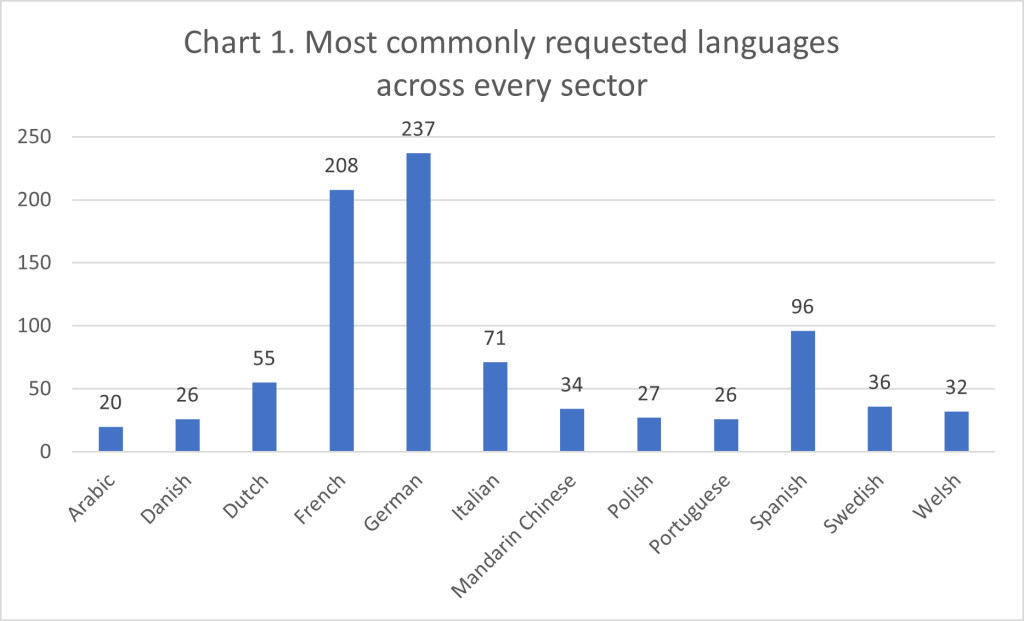
Job sectors
The job sectors were analysed first by creating standardised categories in which to class each job based on information from the job posting. This information could either be an explicit reference to a specific sector, or keywords within the job responsibilities. The standardised job sector categories, in alphabetical order, are:
Sales, Account Management & Business Development is a broad category involving sales, managing client accounts, and expanding a business in various ways, such as through increasing sales, the number of clients, or the geographic area served by the business.
Chart 2. Most common job sectors requiring a second language
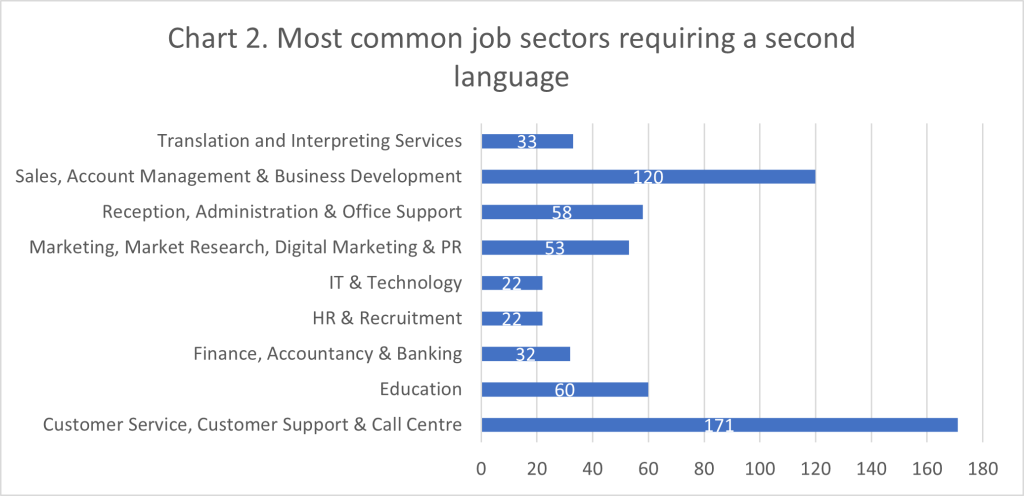
Job Sectors and Top Languages
Once the most common job sectors were found, each top sector was examined to find out which languages were the most requested in each one. Charts 3 through 11 describe the most requested language in each of the top job sectors, with 5 occurrences as the chosen minimum cut-off.
Traditionally, translation and interpreting services and education are the first sectors that come to mind when dealing with language related job opportunities.
Chart 3. Translation and Interpreting services
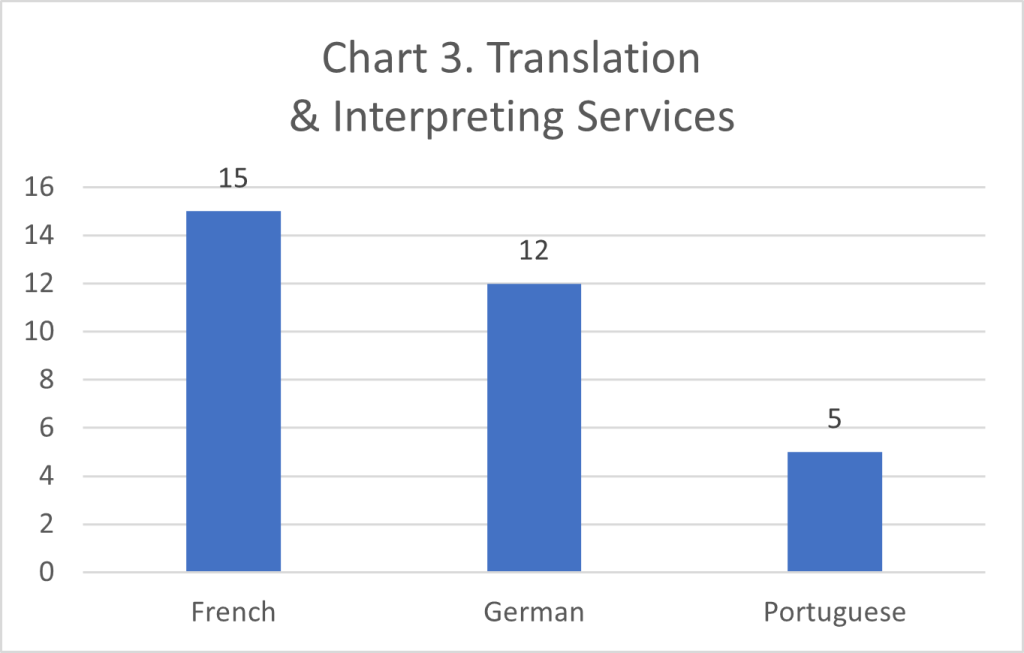
Chart 4. Education
This includes secondary and higher education levels. Spanish is a predominant requested language followed by Mandarin Chinese in the current education system. Interestingly, German, currently highly sought after by employers, is not being taught as widespread as other European languages.
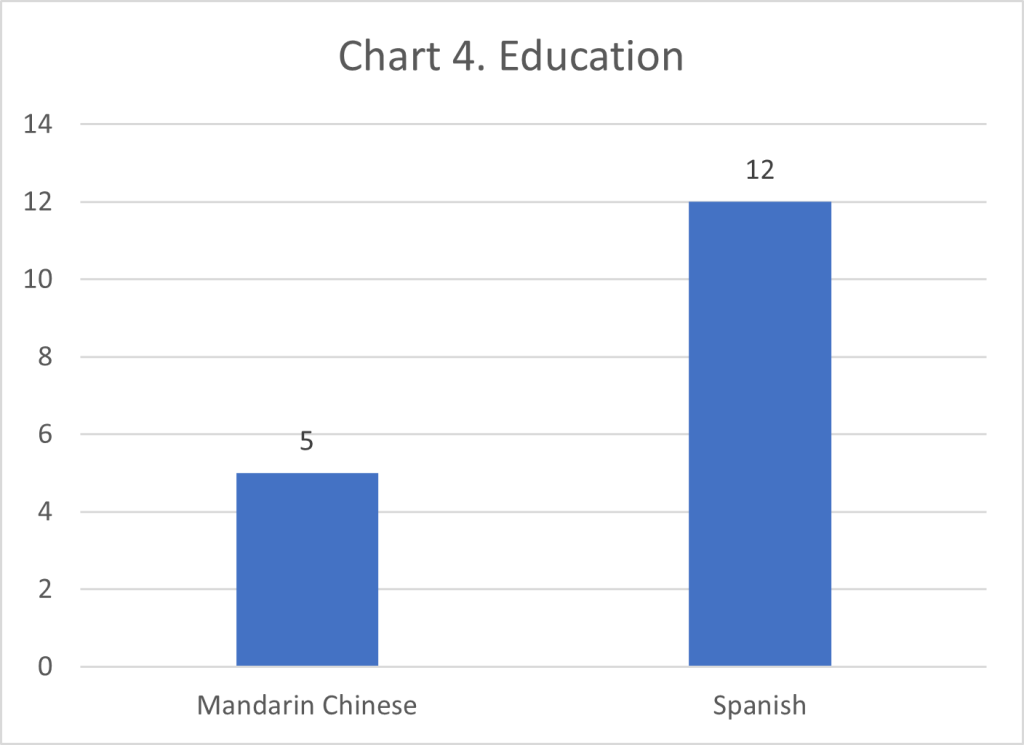
However, the data revealed a wide range of job opportunities in other sectors with a variety of European languages and Mandarin as the non-European one in chart 5 below.
Chart 5. Sales, Account Management and Business Development
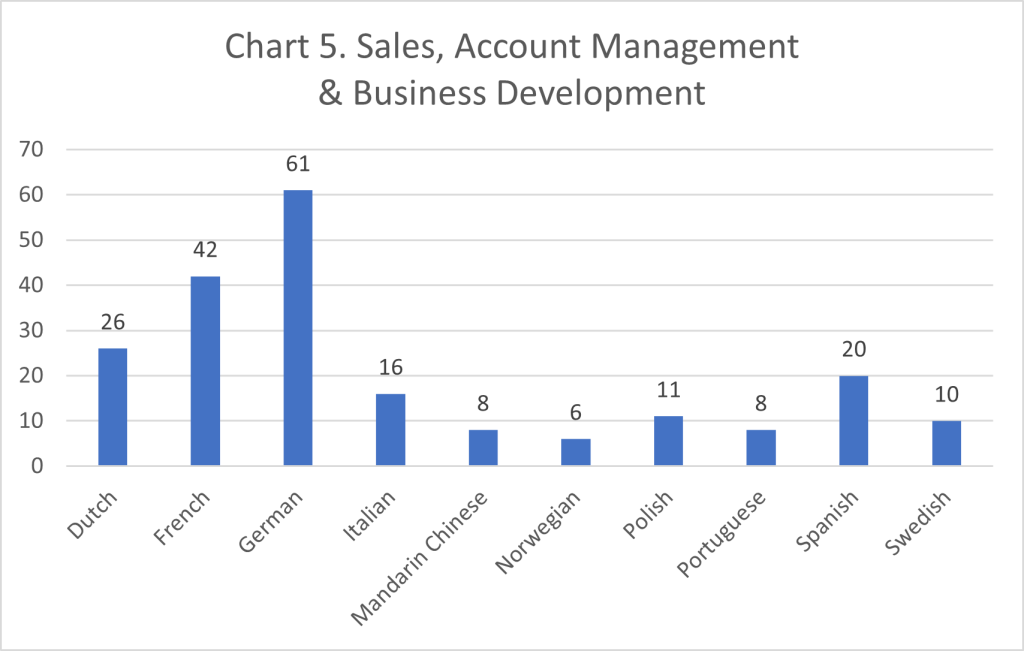
Chart 6. Reception, Administration and Office Support
German still comes at the top of requested languages across most sectors (16 occurrences here) but Welsh makes an appearance in administration related jobs (6) and in Chart 7 (5 occurrences).
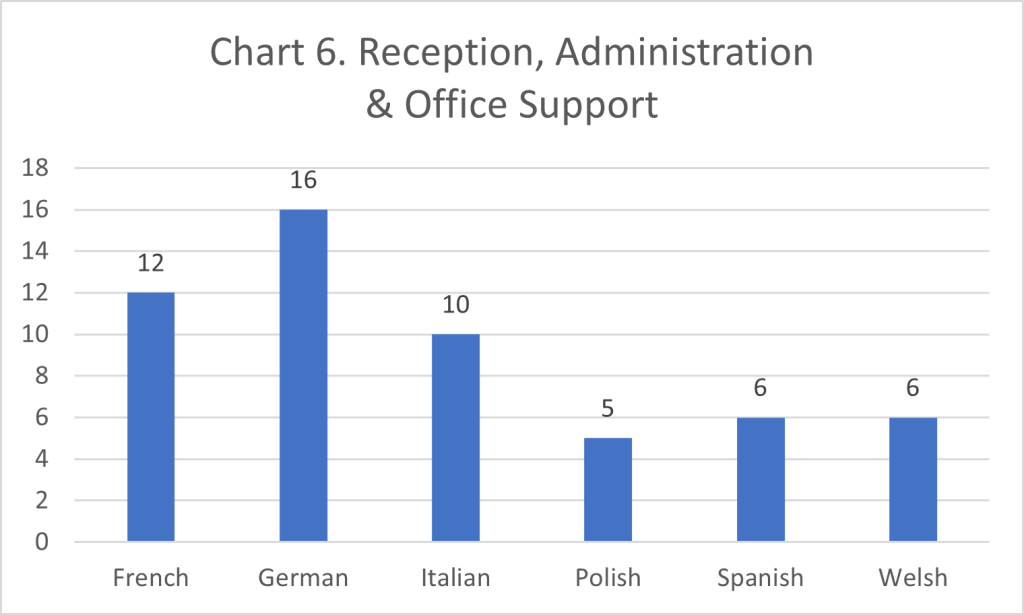
Chart 7. Marketing, Market Research, Digital Marketing and PR
Here, German (22 occurrences) and French (14) are very much needed in the marketing/ digital marketing sectors followed by Spanish and Welsh (5).
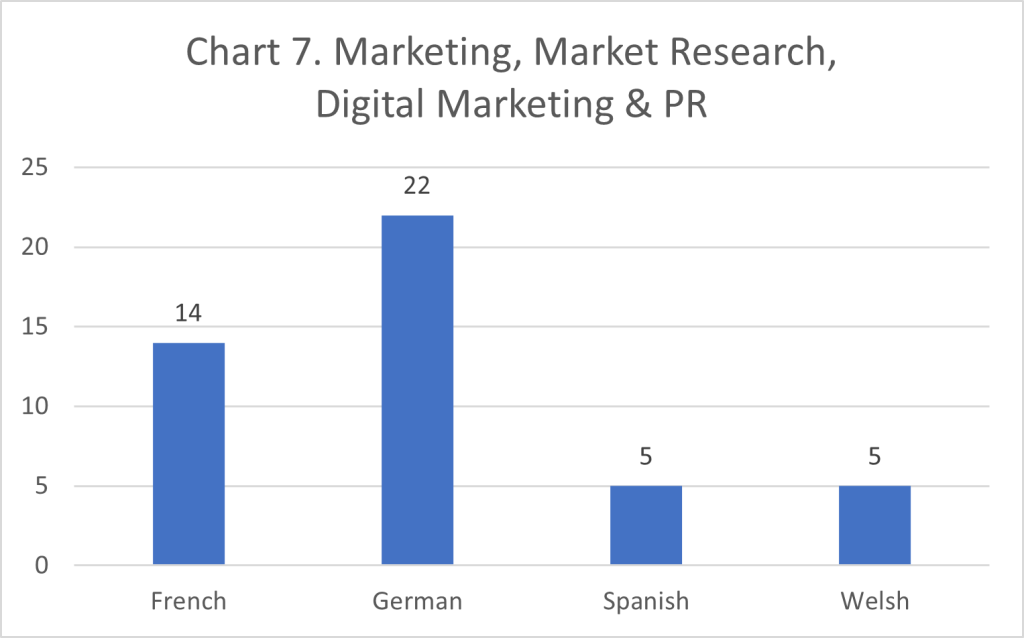
Chart 8. IT & Technology
Romance languages are mostly requested in IT- related jobs (6 occurrences each for French, Italian and Spanish followed closely by German).
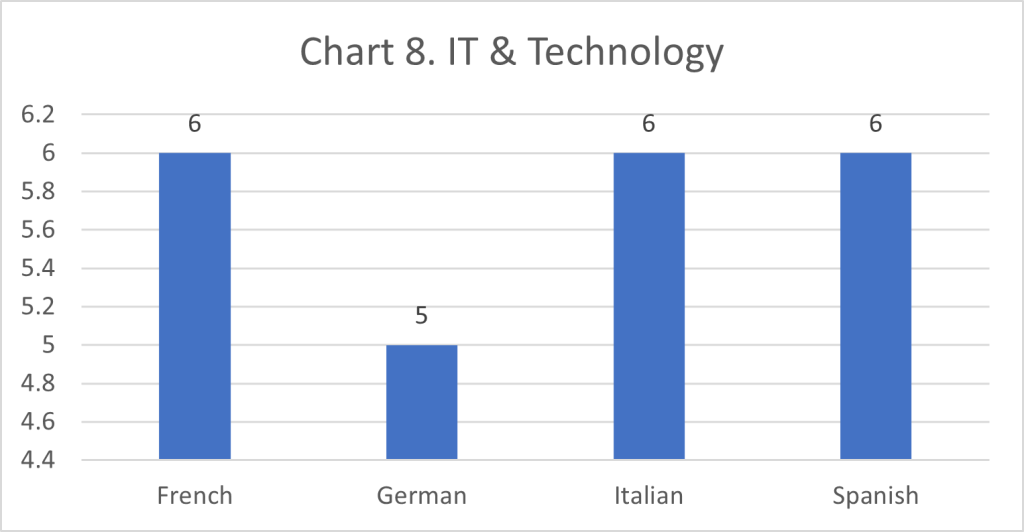
Chart 9. HR & Recruitment
French and German are highly sought after in HR related jobs.
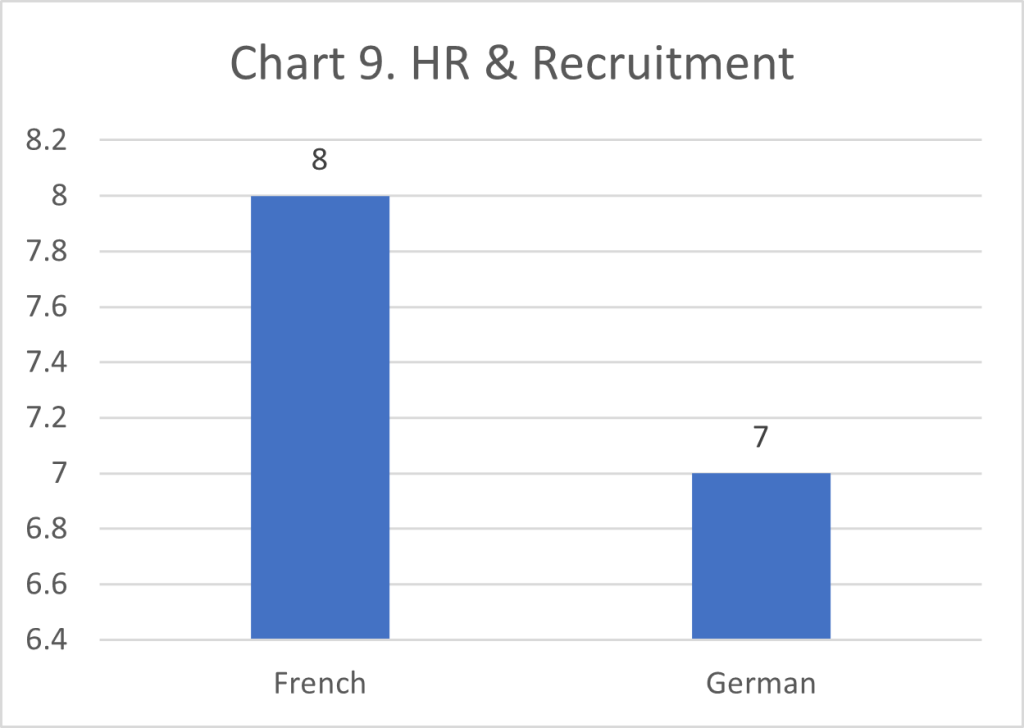
Chart 10. Finance, Accountancy & Banking
Some UK businesses prefer business transactions to take place in foreign languages rather than English.
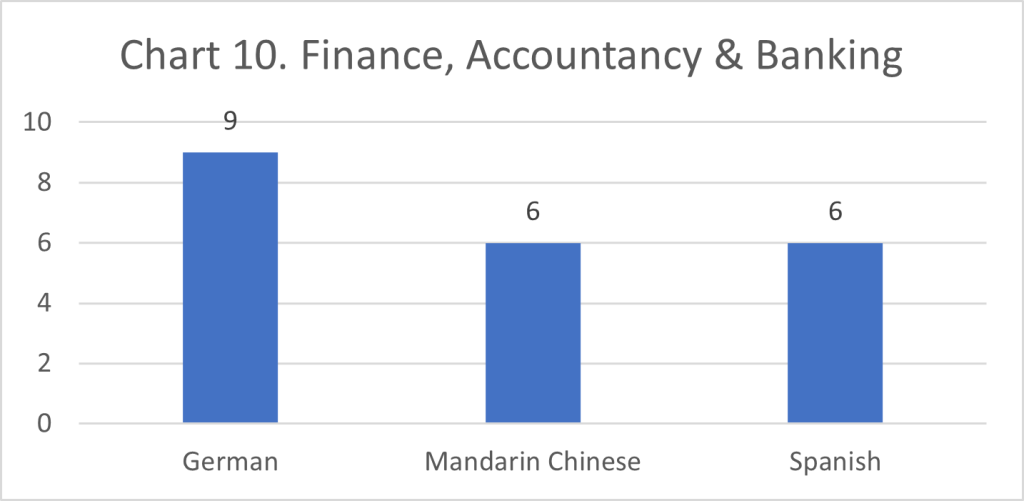
Chart 11. Customer service, Customer support and Call centre
As above, customers in some businesses prefer to be addressed in their native language and not English.
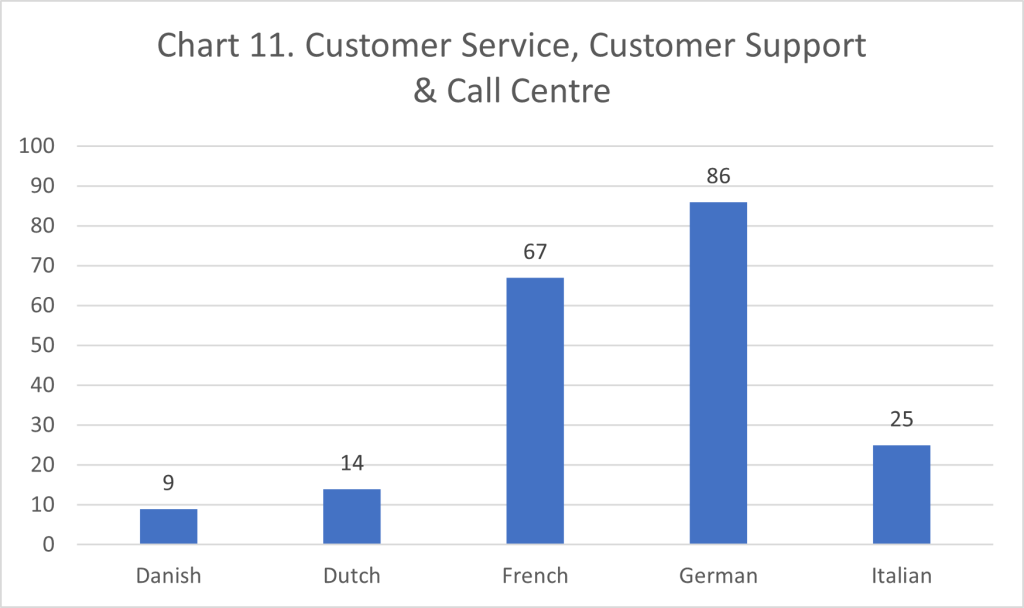
Chart 12. Average Salary by Sector
The last category of job information to be analysed was the salary. Not all job postings contained a salary, with LinkedIn’s posts having only one job with a salary listed. Most that had a salary were annual salaries, but there were some with hourly, daily, weekly, or monthly salaries. Any that were not annual salaries were not included in the analysis, as the working hours for each job varied greatly, and it would have been inaccurate to convert the hourly, etc. wages into annual sums based on a 40-hour work week.
The average salaries for each top sector are presented in Chart 12 below.
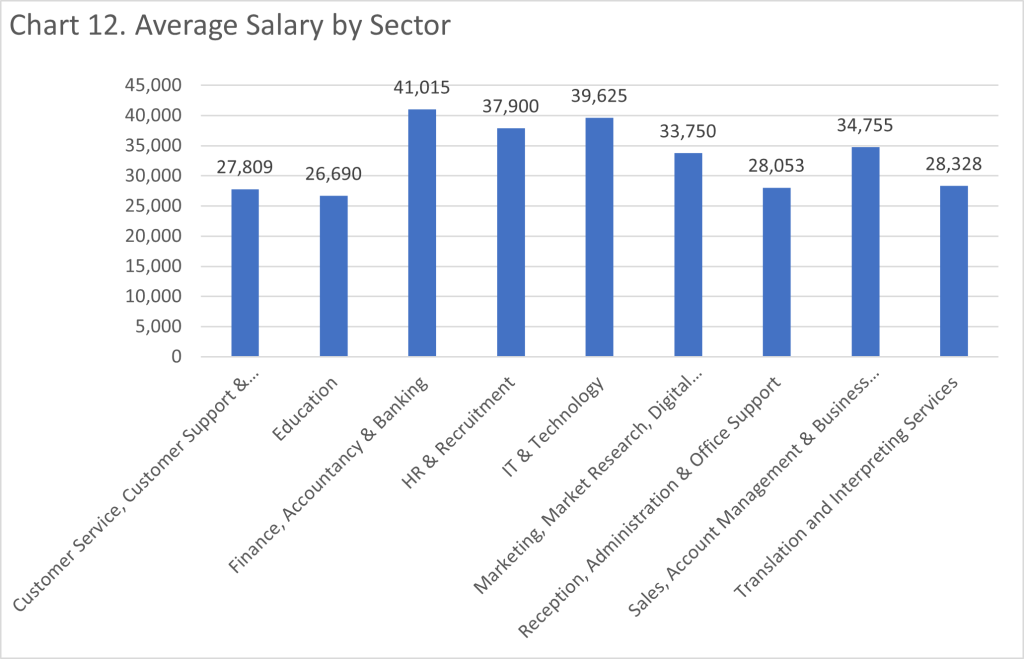
Conclusions
From the obtained data, we can see that, despite Brexit or because of it, the traditional European languages are still very much needed across all job sectors in the UK. Interestingly, German which has been removed from many school curricula, is in very high demand across all sectors. Languages are needed for the markets to thrive and the economy to grow.
The UK needs to invest in language learning and policy makers need to support changes in current practices to encourage the uptake of languages across all education levels.
Acknowledgements
This project is funded by the Faculty of Humanities and Social Sciences Knowledge Exchange Accelerator Fund (University of Portsmouth) to promote interaction between the university and language service providers and policy makers. Special thanks go to Brianna Lale (MA Translation student and soon to be graduate) who worked on the first phase of this project.
Appendix 1: List of all languages found and their number of occurrences
| Afrikaans | 2 | Kurdish Kur Manji | 1 | Thai | ||
| Albanian | 5 | Kurdish Badini | 1 | Tigre | ||
| Amharic | 3 | Latvian | 2 | Tigrinya | ||
| Arabic | 20 | Lithuanian | 5 | Turkish | ||
| Arabic Sudanese | 1 | Malay | 5 | Ukrainian | ||
| Basque | 1 | Malayalam | 1 | Urdu | ||
| Bengali | 5 | Mandarin Chinese | 34 | Vietnamese | ||
| Brazilian Portuguese | 2 | Mongolian | 2 | Welsh | ||
| Bulgarian | 4 | Ndebele | 1 | Yoruba | ||
| Cantonese | 7 | Nepalese | 2 | any European language | ||
| Catalan | 1 | Norwegian | 15 | any foreign language | ||
| Chinese (unspecified) | 4 | Oromo | 2 | any modern foreign language | ||
| Czech | 9 | Pashto | 5 | Eastern European languages | ||
| Danish | 26 | Persian | 1 | Scandinavian languages | ||
| Dari | 4 | Polish | 27 | |||
| Dutch | 55 | Portuguese | 26 | |||
| Estonian | 1 | Punjabi | 2 | |||
| Farsi | 5 | Roma/Romani | 2 | |||
| Finnish | 13 | Romanian | 12 | |||
| Flemish | 1 | Russian | 15 | |||
| French | 208 | Serbian | 1 | |||
| German | 237 | Shona | 1 | |||
| Greek | 5 | Sinhalese | 1 | |||
| Gujarati | 2 | Slovak | 7 | |||
| Hindi | 1 | Slovenian | 1 | |||
| Hungarian | 4 | Somali | 5 | |||
| Indonesian | 2 | Spanish | 96 | |||
| Italian | 71 | Swedish | 36 | |||
| Japanese | 10 | Tamil | 4 | |||
| Korean | 6 | Tagalog | 3 | |||
| Kurdish | 4 | Taiwanese | 1 | |||
| Kurdish Sorani | 1 | Telegu | 1 |